 Petzlover
Petzlover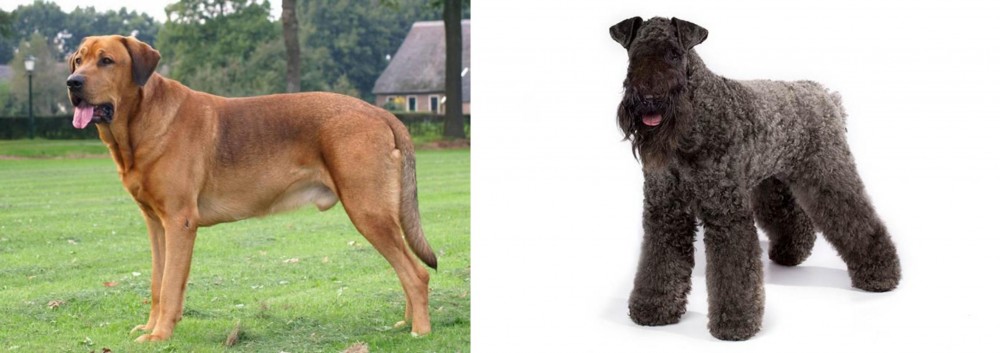 Broholmer is originated from Denmark but Kerry Blue Terrier is originated from Ireland. Broholmer may grow 24 cm / 10 inches higher than Kerry Blue Terrier. Broholmer may weigh 62 kg / 137 pounds more than Kerry Blue Terrier. Broholmer may live 3 years less than Kerry Blue Terrier. Both Broholmer and Kerry Blue Terrier has almost same litter size. Both Broholmer and Kerry Blue Terrier requires Moderate Maintenance.
Broholmer is originated from Denmark but Kerry Blue Terrier is originated from Ireland. Broholmer may grow 24 cm / 10 inches higher than Kerry Blue Terrier. Broholmer may weigh 62 kg / 137 pounds more than Kerry Blue Terrier. Broholmer may live 3 years less than Kerry Blue Terrier. Both Broholmer and Kerry Blue Terrier has almost same litter size. Both Broholmer and Kerry Blue Terrier requires Moderate Maintenance.
 This giant dog, the Broholmer, comes from Denmark and falls into the general Molosser type of Mastiff dog. The breed was originally developed by crossing the local German dogs with the English Mastiffs to create what is also known as a Danish Mastiff. The breed is named after an 18th century game-keeper names Sehested of Broholm. This type of dog has been present however since the Middle Ages in Europe. It started out as a stag hunting dog but quickly evolved into a guard dog. They were greatly favored by the wealthy and nobility, including being featured in portraits with King Frederick VII and Countess Danner.
This giant dog, the Broholmer, comes from Denmark and falls into the general Molosser type of Mastiff dog. The breed was originally developed by crossing the local German dogs with the English Mastiffs to create what is also known as a Danish Mastiff. The breed is named after an 18th century game-keeper names Sehested of Broholm. This type of dog has been present however since the Middle Ages in Europe. It started out as a stag hunting dog but quickly evolved into a guard dog. They were greatly favored by the wealthy and nobility, including being featured in portraits with King Frederick VII and Countess Danner.
Like many European dogs, the Broholmer, did not fare well during the second World War. During this time there was little purebred breeding and their numbers decreased almost to the point of extinction. Brought back by a group called “The Society for the Reconstruction of the Broholmer Breed”. With the support of the Danish Kennel Club, they were successful in bring the breed back. They were recognized by both the Federation Cynoloqique Internationale and the Danish Kennel Club. By 2009 they were being imported to the United Kingdom, hoping to get them onto the import lists of the United Kingdom kennel club (UKC).
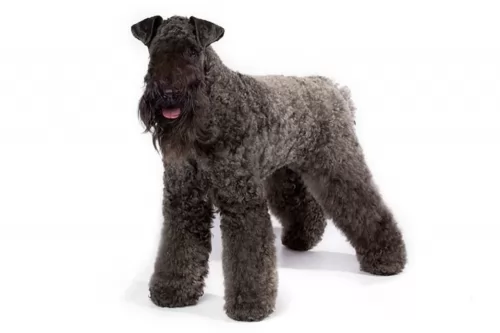 The Kerry Blue Terrier hails from Ireland, with the name of the dog coming from a place known as County Kerry, and Blue being the color of the dog's coat.
The Kerry Blue Terrier hails from Ireland, with the name of the dog coming from a place known as County Kerry, and Blue being the color of the dog's coat.
The Kerry Blue was originally bred to control rats, rabbits and otters and was actually a working dog for a host of different jobs.
It was in 1922 that the United States Kerry Blue Terrier Club was founded and recognized by the AKC in 1924.
 The Broholmer is a very large dog with Mastiff qualities. He is strong, rectangular and powerful in build. He has a massive head and neck with a deep and broad chest. The length of the nose is the same as the length of the skull. He is tall, well built and his thing and hindquarters are powerful. His stance and gait are powerful and intimidating as well. His appearance and size alone account for his guard dog status. However, he is a little smaller than most Mastiffs and he is athletic looking as well.
The Broholmer is a very large dog with Mastiff qualities. He is strong, rectangular and powerful in build. He has a massive head and neck with a deep and broad chest. The length of the nose is the same as the length of the skull. He is tall, well built and his thing and hindquarters are powerful. His stance and gait are powerful and intimidating as well. His appearance and size alone account for his guard dog status. However, he is a little smaller than most Mastiffs and he is athletic looking as well.
The Broholmer is a double coated breed with a short topcoat and a thick undercoat. The color of the Broholmer is yellow or a golden red. Some have white on the feet, tail tip or chest and some have a black mask. Most do not have any mask.
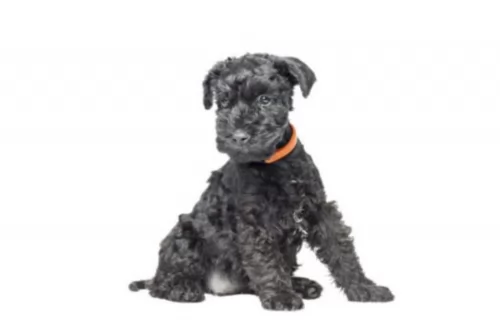 The Kerry Blue is a small dog standing at between 44 to 51cm and weighing anything between 15 and 18kg. He has dark eyes which give him that typical alert Terrier expression.
The Kerry Blue is a small dog standing at between 44 to 51cm and weighing anything between 15 and 18kg. He has dark eyes which give him that typical alert Terrier expression.
The ears are small and are carried up before flopping down. The high-set tail has always been customarily docked, giving him a compact, jaunty appearance but these days, the tail tends to be left long, curling somewhat over the back.
He has a coat which is quite wavy or curly and comes in different shades of grey or blue, while the puppies are born black, gradually becoming more blue. The dog is considered to be hypoallergenic as it doesn't shed a lot.
Kerry Blue Terriers are strong willed dogs, but with training and socialization they respond well to instructions such as sit, come, lie-down and stay. As a Terrier breed he is feisty, lively, strong-willed, stubborn, independent and impulsive. They are loyal and affectionate towards their owners and are amicable with children and pets in the home.
Training and socialization develops a balanced attitude around his human family, other animals in the home and around strangers. He is an active dog too so whether he lives in the city or the countryside, he will require a lot of exercise as he is full of life.
You can’t just put him in the backyard and forget about him. He is an intelligent, social dog who will only do well when he is counted in as a family member.
 The Broholmer is a calm, friendly dog. He is a large dog that thinks he is a lap dog. He wants to be close and snuggle with his people all the time. He is great with kids and other dogs. At the same time, he can be very watchful and protective. Because of this along with his size he needs a strong owner who is clearly the pack leader. He is wary and protective around strangers and can be stubborn if he thinks he is in charge.
The Broholmer is a calm, friendly dog. He is a large dog that thinks he is a lap dog. He wants to be close and snuggle with his people all the time. He is great with kids and other dogs. At the same time, he can be very watchful and protective. Because of this along with his size he needs a strong owner who is clearly the pack leader. He is wary and protective around strangers and can be stubborn if he thinks he is in charge.
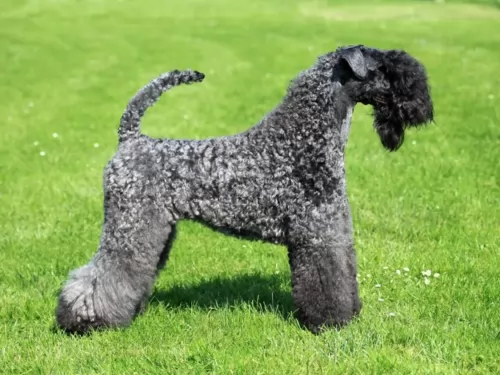 When you bring a Kerry Blue Terrier into your home and your life, you’re going to have a jaunty, lively, comical pet in your home, as he certainly has the reputation of making people laugh.
When you bring a Kerry Blue Terrier into your home and your life, you’re going to have a jaunty, lively, comical pet in your home, as he certainly has the reputation of making people laugh.
He is such an intelligent dog too and has no difficulty with learning new tricks. He takes his role of watchdog seriously too, as he loves his human family and wants to be looking out for them.
When you bring a Kerry Blue Terrier into your home, you can be assured of jolly good fun from a true canine companion.
 The Broholmer faces many of the same health issues as other large breeds, even though he is overall a very healthy breed. Some of the types of health issues the Broholmer might deal with include:
The Broholmer faces many of the same health issues as other large breeds, even though he is overall a very healthy breed. Some of the types of health issues the Broholmer might deal with include:
Bloat – caused by eating a large meal too quickly and drinking a lot of water or exercising too soon before or after the large meal.
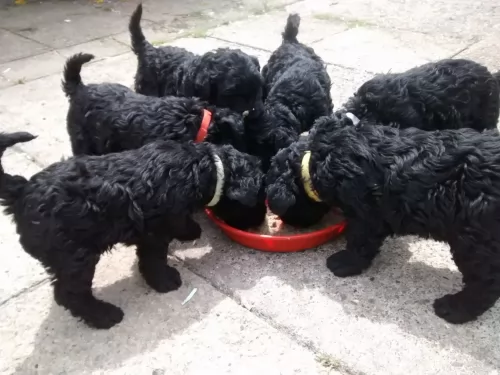 You aren’t going to be running to the vet often with your Kerry Blue as he is a healthy dog breed. However there are some common dog diseases that even the most healthiest of dogs can succumb to.
You aren’t going to be running to the vet often with your Kerry Blue as he is a healthy dog breed. However there are some common dog diseases that even the most healthiest of dogs can succumb to.
Always feed your dog the very best food there is so that he has a strong immune system that can fight off disease.
This is the inward rolling of the eyelid which can irritate the dog’s eye and even cause vision loss. Surgery can treat the problem.
Every dog can succumb to cancer. You may well find a lump or even detect a sore that won’t heal. Treatments for cancer can include medicines, chemotherapy and surgery.
This is an inherited condition to do with the hip joint. It can result in pain for your dog and even lameness. When you discover your pet no longer wants to play and he battles to get up after lying down, he will need to go to the vet. Dogs with this debilitating disease should never be bred.
 Don’t overfeed the Broholmer. Give her about three and three quarters to nine cups of a high quality dry food. Depending on the size of your dog, adjust the amount of food within the guidelines listed here. Feed at least twice a day. Use a large breed dog food.
Don’t overfeed the Broholmer. Give her about three and three quarters to nine cups of a high quality dry food. Depending on the size of your dog, adjust the amount of food within the guidelines listed here. Feed at least twice a day. Use a large breed dog food.
Bloat – when the stomach is twisted and distended. This can cause death is not responded to by a vet immediately.
Eye Issues – Entropion turning inward of eyelids and irritating eye; Ectropium eyelids turn outward, Cataracts and Progressive Retinal Atrophy (PRA) -genetic defects of the retina can cause blindness.
The Broholmer is not an overly active dog but he is big and athletic so has strong exercise needs. A large fenced in back yard is essential or be prepared for several long walks every day. You can play inside games like teaching new tricks or hide and seek but remember this is a big dog. He would love to swim, play frisbee or ball, go hiking or organized activities such as fly ball, agility, rally and obedience. Don’t let your Broholmer over exercise while it is young and still growing. He needs as much mental stimulation as physical exercise.
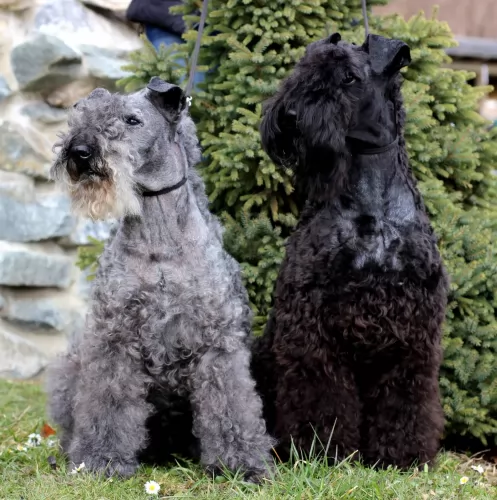 The Kerry Blue’s coat doesn’t shed a lot but it’s a curly coat that will require brushing at least twice a week. He will also require clipping and trimming if you want to keep the coat manageable.
The Kerry Blue’s coat doesn’t shed a lot but it’s a curly coat that will require brushing at least twice a week. He will also require clipping and trimming if you want to keep the coat manageable.
Nutrition is a key part of a healthy Kerry Blue Terrier and instead of just plonking down a bowl of dry kibble every day, make his mealtimes something to look forward to, more sustaining and more interesting.
Top quality kibble is good every now and then but try mixing in some cooked chicken, brown rice, pasta and vegetables occasionally as well as a little bit of raw meat. You will be rewarded with bright eyes, a wet nose, bushy, wagging tail and less trips to the vet.
Make sure there is always a supply of fresh, cool water for him.
Active and lively, your Kerry Blue will need lots of robust exercise – a daily walk as well as ball games which ensure his muscles are kept strong and toned. Not only that, this exercise is important for keeping him fit and also mentally alert.